The Whigs were a political party in the Parliaments of England, Scotland, Ireland, Great Britain and the United Kingdom. Between the 1680s and the 1850s, the Whigs contested power with their rivals, the Tories. The Whigs became the Liberal Party when it merged with the Peelites and Radicals in the 1850s. Many Whigs left the Liberal Party in 1886 over the issue of Irish Home Rule to form the Liberal Unionist Party, which merged into the Conservative Party in 1912.

Frederick John Robinson, 1st Earl of Ripon,, styled The Honourable F. J. Robinson until 1827 and known between 1827 and 1833 as The Viscount Goderich, the name by which he is best known to history, was a British politician who served as Prime Minister of the United Kingdom from 1827 to 1828.
The Tories were a loosely organised political faction and later a political party, in the Parliaments of England, Scotland, Ireland, Great Britain and the United Kingdom. They first emerged during the 1679 Exclusion Crisis, when they opposed Whig efforts to exclude James, Duke of York from the succession on the grounds of his Catholicism. Despite their fervent opposition to state-sponsored Catholicism, Tories opposed his exclusion because of their belief that inheritance based on birth was the foundation of a stable society.
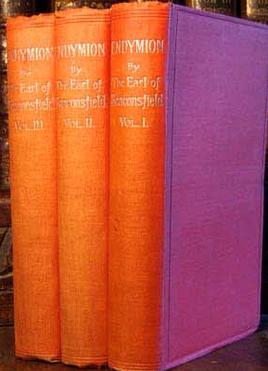
Endymion is a novel published in 1880 by Benjamin Disraeli, 1st Earl of Beaconsfield, the former Conservative Prime Minister of the United Kingdom. He was paid an advance of £10,000 for it. It was the last novel Disraeli published before his death. He had been writing another, Falconet, when he died; it was published, incomplete, after his death.
Coningsby, or The New Generation is an English political novel by Benjamin Disraeli, published in 1844.
The 1768 British general election returned members to serve in the House of Commons of the 13th Parliament of Great Britain to be held, after the merger of the Parliament of England and the Parliament of Scotland in 1707.
The Ultra-Tories were an Anglican faction of British and Irish politics that appeared in the 1820s in opposition to Catholic emancipation. The faction was later called the "extreme right-wing" of British and Irish politics.

The Exclusives is an 1830 novel by the British writer Lady Charlotte Bury, originally published in three volumes. It is part of the then-popular genre of silver fork novels set in high society. It was also published in New York City by Harper the same year in two rather than three volumes. Although the daughter of a duke herself Bury, writing anonymously, used it as an expose of the manners and behaviour of the elite Ton.

Flirtation is an 1827 novel by the British writer Lady Charlotte Bury, originally published in three volumes. Bury, writing anonymously, was a well-known author of silver fork novels set in high society. It was a popular success and quickly ran through three editions.

The Disowned is a novel by the British writer Edward Bulwer-Lytton, originally published in three volumes. It is part of the then-popular genre of silver fork novels, focusing on British high society of the late Regency era. Like many other silver fork novels it was published by Henry Colburn, with the first volume coming out in 1828 and the latter two in 1829. It is set in the late eighteenth century but the political and social themes it refers to have more relevance to the contemporary 1820s.
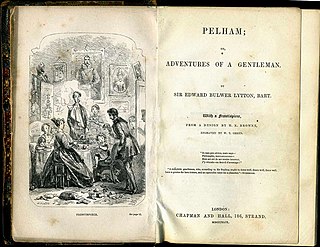
Pelham is an 1828 novel by the British writer Edward Bulwer-Lytton, originally published in three volumes. It was his breakthrough novel, launching him as one of Britain's leading authors. It is part of the tradition of silver fork novels that enjoyed great popularity in the late Regency and early Victorian eras. It follows the adventures of Henry Pelham, a young dandy, in Paris, London and the fashionable spa town of Cheltenham.
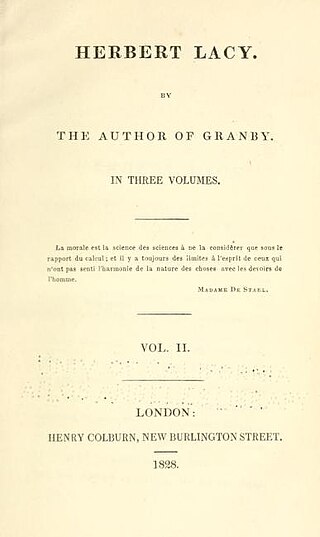
Herbert Lacy is an 1828 novel by the British writer Thomas Henry Lister, originally published in three volumes. It was part of the then-popular genre of silver fork novels depicting life in the high society of late Regency Britain. It was his second novel following Granby (1826). Much of the plot revolves around politics, with the title character elected to Parliament. It also examines the alliance between the aristocracy and growing middle classes Like many of the silver fork novels it was published by Henry Colburn.

Matilda is an 1825 novel by the British writer and politician Lord Normanby, originally published in two volumes. It was part of the emerging, popular genre of silver fork novels that focused on the fashionable British upper classes in the later Regency era, and was his first published work. He followed it with a second silver fork novel, the political Yes and No in 1828.

The Contrast is an 1832 novel by the British writer and politician Lord Normanby, originally published in three volumes. It was his third novel following Matilda (1825) and Yes and No (1828), all three of which were part of the developing silver fork genre focused on the fashionable aristocracy and upper classes of the late Regency period. It was written at the time of the Reform Act and examines the mixing of relationships across classes.

Granby is an 1826 novel by the British writer Thomas Henry Lister, published in three volumes. His first novel, it was part of the emerging genre of silver fork novels which take place in fashionable upper class settings of Regency Britain.
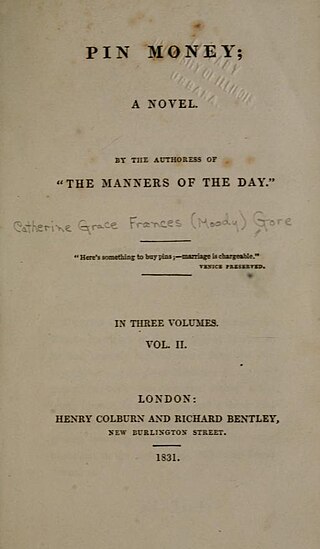
Pin Money is an 1831 novel by the British writer Catherine Gore, originally published in three volumes. It was part of the group of silver fork novels published during the later Regency era that focuses on life in the fashionable British upper classes. The Westminster Review considered the male characters to be more skilfully drawn than the female. Another review suggested that there was too much product placement in the novel, advertising the goods of various London shops.

The Cabinet Minister is an 1839 novel by the British writer Catherine Gore, originally published in three volumes. It is part of the tradition of silver fork novels popular during the era which focus on the upper-classes, and part of a subset of books which focus on British politics. It follows events in the Whig movement from the Regency Crisis of 1810 through the Great Reform Act in 1832 to the present in the early years of Queen Victoria's reign.
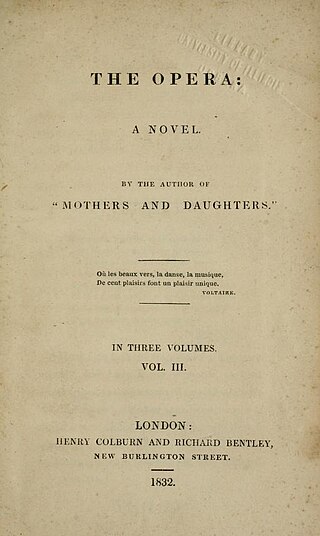
The Opera is an 1832 novel by the British writer Catherine Gore, originally published in three volumes. It is part of the tradition of silver fork novels focusing on British high society of the later Regency era. One contemporary reviewer launched a critical attack on its elitism, and lack of realism about everyday lives. The novel makes many references to the ongoing debate about the Reform Bill.

Mrs. Armytage; or Female Domination is an 1836 novel by the British writer Catherine Gore, originally published in three volumes. It is a silver fork novel focusing on fashionable high society, a popular genre to which Gore contributed several books. The novel functions as an analogy for the contemporary political situation, with Gore advancing a pro-Whig viewpoint. It was very successful on its release, and was reissued by Gore's publisher Henry Colburn in 1848.

Women as They Are is an 1830 novel by the British writer Catherine Gore, originally published in three volumes.It is part of the silver fork novels focusing on fashionable high society of the later Regency era. It is also known by its subtitle The Manners of the Day. It was her first novel published by Henry Colburn, and was a considerable success. George IV described it as "the best bred and most amusing novel in my remembrance.















